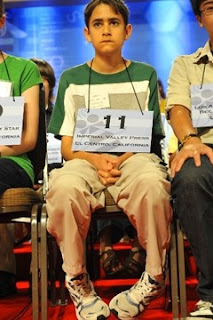While perusing the New York Times' online counterpart today, I found an op-ed entitled "Spelling Out the End," in which author Tania James delves into her experience as a competitor (at age 14) in the Bee armed with her newfound insight as an observer of the annual event. After reading this piece, I am left with only with a feeling of puzzlement at - and resentment of - the principle values of an event such as the National Spelling Bee.
In the article, James writes that, while simply making it to the National level as a child-speller is tough enough, "Fewer will make it to the following day’s semifinals, where one mistake
means elimination." James adds that "I’d wager that many of them will be silently praying,
Not on the first word. " This account was startling to me at first read, as it highlights the immense amount of pressure and trauma that the children participating in the event are put through, even at such young ages.
James continues to describe part of her personal experience - at an even younger age - of witnessing her phenomenally-talented older sister achieve consecutive victories in the Bee: "'Don’t worry,' a spelling bee official told me after one of her victories. 'Your turn’ll come too!' I thought, 'Does it have to?'" The phrase 'does it have to?' only further punctuates the fact that participation in the bee was, for James, something that she was pressured into by her family rather than something she wanted to do for herself.
The final message in the article that made me question the ethics and necessity of the bee is an account by James of the time she had to compete against her sister at her school's bee in order to qualify for the national event: "It came down to the two of us [James and her sister] at the mike, spelling word after word in an awkward duet, each waiting for the other to hit a false note." It's interesting to think what must have been going through James' head at that moment considering she must have held so many mixed emotions, spelling words in front of an audience and a panel of judges for reasons she most likely did not fully understand while both rooting for her older sister and hoping that she would fail. There's really no outcome to a competition like that which doesn't strain family relationships or leave someone unhappy.
The final message in the article that made me question the ethics and necessity of the bee is an account by James of the time she had to compete against her sister at her school's bee in order to qualify for the national event: "It came down to the two of us [James and her sister] at the mike, spelling word after word in an awkward duet, each waiting for the other to hit a false note." It's interesting to think what must have been going through James' head at that moment considering she must have held so many mixed emotions, spelling words in front of an audience and a panel of judges for reasons she most likely did not fully understand while both rooting for her older sister and hoping that she would fail. There's really no outcome to a competition like that which doesn't strain family relationships or leave someone unhappy.
Of course, this is not to discredit the contestants that legitimately love to spell and to participate in the bee, yet it seems as if many of the kids who are brought to attend can become very overwhelmed and traumatized by the whole experience, one which they most likely were pressured into undertaking in the first place.
And that's not to mention the apparent triviality of it all; memorizing sequences of letters matched to pronunciations within a very competitive atmosphere. It's all the kind of thing Mr. o'Connor and Mr. Bolos seek to avoid in our American Studies curriculum, which is part of what makes the class such a pleasure to be a part of. I would certainly hate to be put in that kind of situation, and I'm sure many of my peers feel the same way.
But what do you think of the concept of a national spelling bee and the effects it can have on its contestants? Maybe it isn't such a bad thing after all?
And that's not to mention the apparent triviality of it all; memorizing sequences of letters matched to pronunciations within a very competitive atmosphere. It's all the kind of thing Mr. o'Connor and Mr. Bolos seek to avoid in our American Studies curriculum, which is part of what makes the class such a pleasure to be a part of. I would certainly hate to be put in that kind of situation, and I'm sure many of my peers feel the same way.
But what do you think of the concept of a national spelling bee and the effects it can have on its contestants? Maybe it isn't such a bad thing after all?
